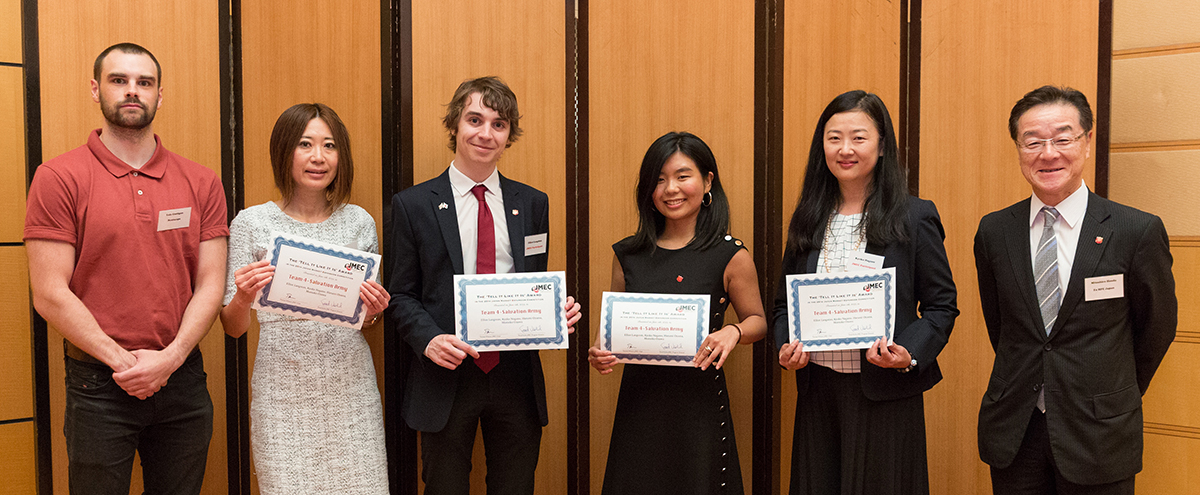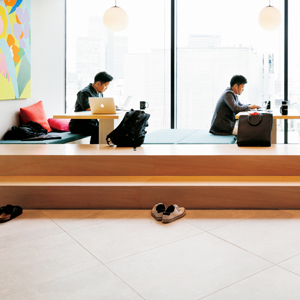The annual Japan Market Expansion Competition (JMEC) held its awards ceremony on 5 June at Tokyo American Club, and this year there was a strong British presence.
A young British man, Elliot Langston, was among the high-flying participants. He and his peers on Team 4, who were tasked with developing a market expansion plan for the Salvation Army, received the “Tell It Like It Is” Award.
The award recognised their bold strategy of redefining the Salvation Army’s initial scope of work and proposing a feasible plan.
This was in line with JMEC’s aims: to enhance the business skills of emerging executives via intensive mentoring, lectures and feedback sessions with mentors and consultants, and to deliver hard-nosed yet actionable business plans to project clients.
Speaking to ACUMEN, Colonel Kenneth Maynor, a territorial commander in the Salvation Army, said: “We had the remarkable experience of bringing on a JMEC team of young professionals who were energising and really terrific to work with. They looked at our thrift store and bazaar operations, and gave us remarkable insights and great business strategies moving forward”.
Langston, a leader on Team 4, said: “The project that the Salvation Army proposed to us was very ambitious. As the project went on—and looking at how they could achieve their goal of expansion in Japan—we decided to do a deep dive into the organisation itself and reframe the scope of work”.
The business plan Team 4 proposed aims to strengthen the Salvation Army’s foundations in Japan, and to use that as a springboard for greater expansion. To that end, the proposal made efficiency and strategy recommendations—including suggestions on how the organisation can increase its visibility in Japan.

Consultant Luis Costigan (left) and mentor Mitsuhiro Honda (right) with Team 4 members Harumi Oyama, Elliot Langston, Momoko Ozawa and Kyoko Nagano, who developed a strategy for the Salvation Army. PHOTO: LIFE.14
Saving souls
Established in London in 1865, the Salvation Army—a global charitable organisation as well as a Protestant denomination of the Christian church—was among 12 project clients to take part in this year’s JMEC competition.
For Maynor, participating in the programme was an opportunity to reassess the charity’s expansion challenges in Japan and to open up new avenues for growth and engagement with the local community.
What are these challenges?
“Some of it relates to not telling the story of the Salvation Army’s work every day in a compelling way. The Salvation Army helps and supports thousands of people in Japan”, he explained. Every night, there are thousands of people who sleep under a Salvation Army roof, he pointed out.
“But I think most generations—particularly younger people—are not aware of that. So, the Salvation Army has had to take a deep look at how to share what we do so that people are aware of it, and to think about how they can realistically support the Salvation Army”.
Maynor has lived in Japan since 2016. However, the Salvation Army itself has had a footprint here for more than 125 years.
With headquarters in the Jimbocho area of Tokyo’s Chiyoda district, the organisation serves communities across Japan via its network of hospitals, grace homes and childcare centres.
“The Salvation Army in Japan has services from Hokkaido all the way down to Yahata, in Kyushu, and Takamatsu, in Kagawa. The organization provides housing and care for children ages two to 19, but really we care for people up to 104 years old. We provide childcare centres, grace homes, hospitals and specialised care for people who have been impacted by dementia”.
But the organisation has faced a challenge in explaining that value to the community in Japan. As a result, the Salvation Army had—up until the experience at JMEC—been at a loss as to how to re-engage with locals.
With greater transparency and a clearer engagement strategy than before, Maynor is upbeat that they can fully reconnect with the community, opening up local participation and volunteerism.
How can individuals in Japan support the cause?
“That’s a great question. I think it begins with good conversation—of finding a Salvation Army centre, going in and talking with a Salvation Army officer. There are many opportunities to volunteer”.
Career investment
For Langston, a recent graduate of the University of Kent, taking part in JMEC has been the best decision of his life and a ladder into the corporate world in Japan.
A self-sponsored participant, he is currently an assistant English language teacher in Tokyo, a member of the Japan Exchange and Teaching Programme, better known at JET.
As a result of his experience in JMEC, he is set to transition into work this summer in Tokyo, and in an organisation that he became familiar with during the JMEC experience.
“Whilst it was pricey, I think it was worth every penny. This is one of the best choices I’ve ever made. In the lectures alone, I learned more than in entire modules in university”, he told ACUMEN.
Originally from Folkestone in Kent, Langston took on the JMEC challenge because of what it could mean for tomorrow. “I’ve always been interested in continued learning after college, and I thought it would be a great investment in my future. It has been very educational. And just writing the business plan itself is a really good, intense and hands-on experience”.
That is not to say it has not been challenging. Langston recalls evenings and weekends sacrificed for the programme, and weeks where he went without much sleep. And he did this while holding down a full-time job as an English teacher.
Despite the hardships, where there any highlights? “It’s hard to pick a specific moment. At the end of it, there was just this sense of fulfilment. So, for example, I volunteered to be team leader, and it was the first time I’d done any managerial or leadership task. Those are the kinds of skills I think I can use in the future”.
Langston heard about JMEC from a friend of a friend who is an alumnus of the competition. Would he recommend it to anyone? He would.
“If you are thinking of starting a career in Japan, the JMEC programme is a great first step; it’s a great boost towards building a network here in Tokyo. But it’s also really educational and challenging. From the people you work with and the clients you help, it challenges you on so many levels. If you can find a scholarship, go for it. But if you self-fund, it’s a really great investment. I really recommend it”.

Team 3 members Marisa Cassidy, Charlie Subramoney, Maria W. Domingo, Yoichiro Ishikawa with mentor Jay Johannesen, consultant Gareth Allen and representatives of Project Client Pearson PLC.
Language testing
London-based global education company Pearson PLC was a Project Client this year. They partnered with Team 3 for their Japan marketplace expansion plan, which took third place.
Pearson’s involvement in JMEC, however, goes deeper. As the UK’s largest awarding organisation for academic and vocational qualifications, as well as other learning programmes, Pearson—via the independent Pearson Assured certification—provides international benchmarks against which programmes such as JMEC can be audited for design, processes and delivery. For JMEC, the annually awarded certification ensures professionals attending the programme receive quality training every year.
Speaking to ACUMEN about the JMEC results, Pearson Qualifications & Assessment Director for Asia Stuart Connor said: “It’s a terrific achievement and we are extremely proud of the team for their efforts in taking what was a challenging brief and really delivering something insightful and creative that will help move our business forward, not just in Japan but globally.
“One of our largest and fastest-growing businesses is in English-language proficiency testing, using artificial intelligence to deliver fast and accurate test results and performance diagnostics. JMEC helped us research the Japanese market for language testing and what types of customer needs are currently unmet. Pearson has been supporting JMEC for five years as a sponsor, but it was great to be able to experience the value of the service as a client”.


